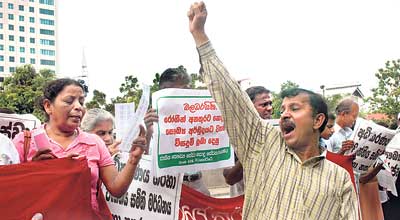
Unions want more powers to reduce public sector strikes
Trade unions in Sri Lanka’s mammoth public sector are asking for the right to appear before the Public Services Commission and the right to go to courts. This is part of a new set of recommendations to reduce strikes in the public sector. Last week 160 trade unions from the government sector and government officials, met in Colombo to launch a Strategy for Public Sector Dispute Settlement. This is a proposed new system to settle disagreements in the public sector. The recommendations have been developed with government and trade union participation, with technical support from the International Labour Organisation (ILO). The ILO says not having a mutually agreeable mechanism to address problems of workers in the state sector is one reason for high inefficiency and repetitive strikes. “It has given rise to distress to all parties, enormous inefficiencies in the public service and at last, but not least, anger and frustration for the government the workers, as well as for a big share of the population,” said the head of the ILO office in Sri Lanka, Tine Staermose. Strike -free zones Sri Lanka’s public sector is one of the largest in the world with a nearly one million workforce. All essential services are in the hands of the state workers but the sector, which is over 80% unionised, is also noted for inefficiency and frequent strikes. At this point the government estimates that strikes in the public sector cost the country 4% of national GDP. So, the government is calling for strike-free zones to attract investments and generate jobs. “Many countries have strike-free zones. Investors go looking for these places. We are not saying we should allow exploitation of workers but investors expect stability,” said Minister of Public Administration and Home Affairs, Karu Jayasuriya. The ground reality however, is far from a strike free zone. “The trade unions in sectors that can hurt the people the most, are the first to go on strike. Like the doctors. When trade unions in the railway go on strike, it is the same. People can’t go to work. Children can’t go to school. The entire country is hurt,” said Minister of Labour Relations and Manpower, Athauda Seneviratne. The minister said trade unions in Sri Lanka prioritise politics over workers.“The problem is, trade unions are linked too much to political parties. So the trade unions are working towards helping the political parties. Even May Day has been politicised and is used as a political party display of power. Your flag should be the red flag of the worker, not the flags of the political parties,” said the minister. Run out The unions shot back saying that they have no choice but to go on strike under existing conditions, whatever the politics. The unions use words like “unfair”, “biased” and “ineffective” to describe the current system for settling disagreements in government jobs.Under the existing system trade unions are not allowed to take cases to the Pubic Services Commission, the national watchdog for the public sector. The unions say this is unfair. “Only individuals can go before the Public Services Commission (PSC) and the Administrative Committee (AAT). But as individuals, workers don’t have the expertise and the resources to state their case properly before such bodies. They are not lawyers, so they don’t know how to present their case. So the system is biased against them,” said Piyadasa. Trade unions say the application of the current system is such, that it makes workers feel worse after trying to settle their problems. “When there is a grievance, a person can complain to the department head. Then they can go to the PSC. But how the system works is, the PSC asks the department head for an opinion. So if it is the department head itself, who is the problem, the worker gets no relief. Anyway, the appealing party does not get a chance to defend their case. So of course the PSC listens to the department head and says it can’t do anything. Then the worker must go to the AAT. But even if the AAT says the department head is wrong, the department heads does not have to implement the AAT decision. So the system is completely unfair,” explained Piyadasa. This method of resolving problems, say unions, leads to a bad attitude and poor work quality, not to mention an itch to go on strike.So now, trade unions are asking for the right to represent cases before the PSC and the AAT and to appear before courts. Unions are also asking for trained, arbitration services. These and other recommendations, agreed on by the government and trade unions, are to be tested at the Ministry of Transport and the Ministry of Public Administration for one year. Trade unions are hoping the recommendations will be introduced as law after the testing period. |
|
||||||
|
||||||
| || Front
Page | News
| Editorial
| Columns
| Sports
| Plus
| Financial
Times | International
| Mirror
| TV
Times | Funday Times || |
| |
Reproduction of articles permitted when used without any alterations to contents and a link to the source page.
|
© Copyright
2008 | Wijeya
Newspapers Ltd.Colombo. Sri Lanka. All Rights Reserved. |
